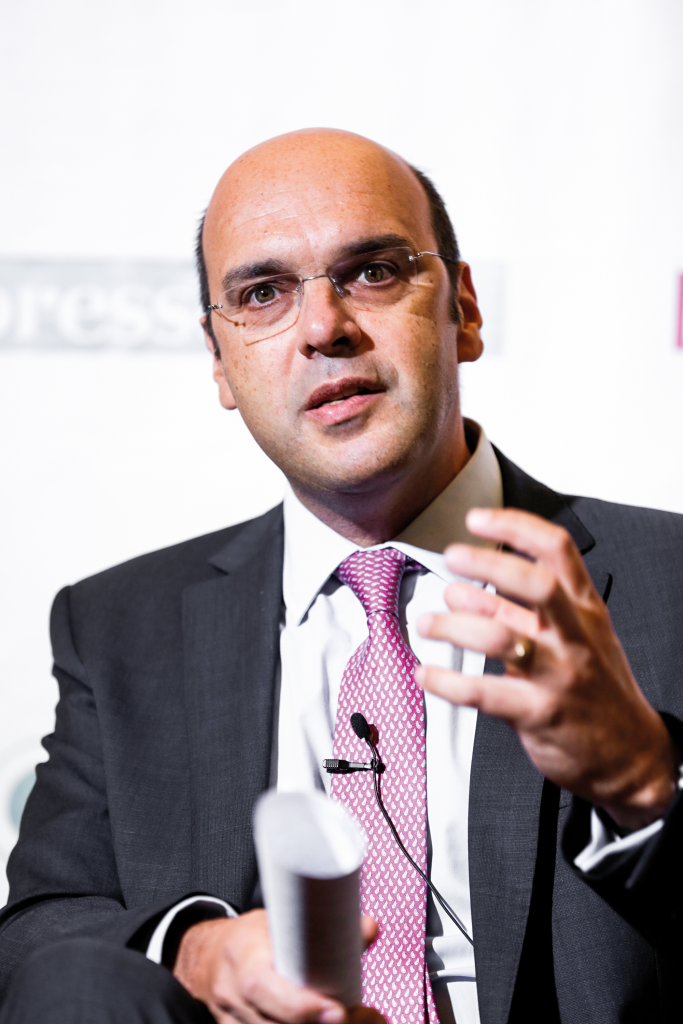The Deputy and Economy Minister argues that the Government was able to read the momentum created around digitalization. But he warns: companies have to create conditions, “including wage conditions”, to have highly qualified people.
What assessment do you have so far of implementing the Industry 4.0 Programme?
Through the Industry 4.0 programme (i4.0) we have started to prepare Industry and Portuguese companies in the transition to a digital economy, a model in which innovation, knowledge, technology are essential pillars.
The balance is very positive. In a first phase, starting in January 2017, we acted in six areas of intervention: training of human resources, technological cooperation, StartUP i4.0; financing; internationalization; and legal and normative adaptation. 95% of the 64 measures defined in the Industry 4.0 programme (i4.0) were carried out, covering around 25 thousand companies and mobilizing 530 thousand people.
This phase focused on a set of measures to demonstrate and mobilize, where it was possible to highlight a group of leading companies in terms of their digital capacity and obtain a digital diagnosis of the economy. There are companies in Portugal that are actively investing in the digitalization of their production processes, namely in line with the requirements of their customers, and in digitalizing their relationship with consumers. The development of competence and R&D centres in this field has been a relevant investment. These results motivate us to pursue public support for digitalization in companies. In April this year, the Government launched a second phase of i4.0, a new impetus with measures of a more transformative nature for the massive expansion of digital to SMEs and based on a consultation process with more than 50 entities. The intervention axes were consolidated into three areas – generalize, train and assimilate – and resulted in 11 measures aimed at the training of human resources and the training of companies. We aim to involve 20 thousand companies, train more than 200 thousand workers and finance more than 350 transformation projects. We estimate the allocation of 600 million Euros for the first two years for this transformation phase.
This Government adopted innovation as a central element of the competitiveness of the Portuguese economy and the creation of wealth. The digitalization of the economy is one of the dimensions of value creation and a technological trend in which Portugal is positioning itself and in which this Government has invested in matters of public policy and channelling of resources.
The President of the Republic called for a “broad, enlightening and informed 4.0 dialogue about the new revolution”. Are we achieving that?
The objective now is to provide the national business sector with all the means to take advantage of the opportunities that arise from the current digital revolution and guarantee responses to the challenges that the revolution poses to companies, entrepreneurs and workers.
For Portugal to continue to grow and guarantee the objective of a decade of convergence with the European Union, measures are necessary in the areas of training / qualification of human resources, investment and innovation. For this new phase of generalization of i4.0, notices and instruments were designed, which contemplate these various axes so that the reality becomes new digitalization and production processes in all companies, regardless of size, raw material and geographic location.
The work carried out with the creation of more clusters in several sectors of the Economy has also been fundamental. After working together to identify needs in terms of professional training, incentives for research and training and external promotion, it was possible to agree on common objectives and join efforts.
I emphasize that, in April 2018, a joint declaration was signed between the Government and the PSD party regarding Portugal’s preliminary position in relation to the European Union’s Multiannual Financial Framework 2021-2027. This document establishes national public policy priorities within the European framework, with digitalization being an area of transversal action in the qualification, competitiveness and territory agendas.
What are the advantages of handing over the operational coordination, monitoring and evaluation of the Digitalization Strategy for Industry 4.0 to an external entity, in this case COTEC Portugal?
The European Commission highlights i4.0 on the Digital Transformation Scoreboard as a good example compared to approaches to digital transformation in other member states. In particular, the bottom-up approach in the design and implementation of the programme is highlighted, with coordination carried out through a private association – COTEC.
In this regard, I would like to highlight the governance of the Programme, which has a strategic committee formed by multinational companies and relevant entities in the digital field, thus complementing the execution and monitoring of the measures.
“[DIGITALIZATION] IS A TECHNOLOGICAL PHENOMENON THAT IS NOT COMPATIBLE WITH THE WILL OR LACK OF IT OF AN ECONOMY OR GOVERNMENT TO PARTICIPATE IN IT”
Pedro Siza Vieira
How can we guarantee that such a structural issue can remain on the government’s agenda, regardless of political cycles? Would a regime pact make sense on this issue?
Revolution 4.0 is an opportunity for Portugal to position itself as a frontrunner. For the first time, we have the resources – knowledge and qualified resources – and proven evidence in this field to aspire to this position. In line with European priorities, Portugal must work on the different digital fronts: in infrastructures, in connectivity, in the processing and use of data, in regulation and, of course, in the economic exploitation of this potential.
The digitalization of the economy and society relies on the effort and continued good results of the business, associative, financial, scientific, technological and naturally political communities.
It is a technological phenomenon which is not compatible with the will or lack of it of an economy or Government to participate in it, but that certainly benefits from the alignment of commitment, effort and collaboration of all. The role of public authorities is to continue to support society’s digitalization process, promoting the participation of companies, the inclusion of citizens and the impacts on Education, Science, Technology and Public Services.
As I mentioned earlier, the digital topic was precisely one of the transversal areas that deserved a strategic consensus between the Government and the PSD party, regarding public policy priorities in the context of the next 2021-2027 community financial cycle.
How far is the state willing to go to support this revolution, which is taking place mainly in the private sector? Through a framework of specific tax benefits, for example?
Currently, the Government has a set of programmes in the digital field, such as Industry 4.0 and Interface, in the interaction of companies with universities and technological centres in digital aspects; Simplex + in administrative modernization, INCoDe 2030 in digital skills or investments in digital infrastructure (broadband and WiFi).
These public initiatives complement and reinforce the initiatives of companies from entities in the Scientific and Technological System in the development of digital areas. They also contribute to the attractiveness of foreign direct investment in the digital field, namely with the significant and continuous flow of installation of centres of competence and engineering in Portugal.

With regard to Industry 4.0 in particular, a mention should be given to the launch of action-training programmes, which exceed 70 million Euros, to guarantee the objective of training 200 thousand people so that they can work in a digital environment. These are programmes that involve business associations and IAPMEI – Agency for Competitiveness and Innovation.
New notices have been launched or are in the process of being launched in the Qualification Incentive Systems and new applications for the Productive Innovation Incentive Systems, to also support this process. The i40 Capitalize Credit line was also redesigned, with a grant of 100 million Euros, an increase in the length of operations (from 4 to 7 years), an extension of the grace period (from 12 to 24 months), an increase in the guarantee commission bonus (from 50 to 100%) and an increase in the investment realization period (from 12 to 24 months).
When the objective is no longer just the survival of companies, the Government has the role of accelerating growth and numerous instruments to facilitate credit have been created, as well as conditions to leverage business investment and the recapitalization of companies. Tax reform contemplated the continued expansion of tax deductions and benefits for business investment.
The European Commission has already concluded that Portugal has the second most favourable tax system for business investment and the best in terms of remuneration and capitalization of companies.
Are Portuguese entrepreneurs, particularly small and medium-sized ones, sufficiently aware of what Industry 4.0 is and the urgency to adopt it?
Our entrepreneurs faced the economic and financial crisis with resilience, empowering companies, reinventing products and processes through innovation, taking advantage of the skills of their workers and promoting their competitiveness in foreign markets. Digitalization, together with climate change or demography, is one of the global phenomena that companies consider in their strategies and that Portuguese entrepreneurs have been reflecting on in their activities and positioning.
The digitalization of processes has already become part of the daily lives of many national companies and it is to further generalize this number that we launched Phase II of i4.0. Companies have Shift 4.0 at their disposal, which allows them to make a self-diagnosis about their digital maturity and to know where they are in this moment of massive transition to modernize. The promotion of the exchange of knowledge and experiences, through the approximation between academia and companies, and the reinforcement of the Open Days Programme will focus on good examples and on those who are further ahead on that path.
The Government is committed to continuing to invest in digital skills: be it in students’ curricula, in the conversion of assets, but also in the continuation of the training of workers and management staff. A very relevant component of the productivity of the Portuguese economy is precisely related to the qualifications of the management structures of companies. The training of entrepreneurs for the challenges of Digital era is essential to broaden the digitalization strategy in their activities.
How do you articulate this strategy with the national ecosystem of StartUPs, which despite being recognized for having very high levels of innovation, also have associated with them very high failure rates?
This Government launched and is executing a programme specifically aimed at supporting entrepreneurship, through StartUP Portugal, which acts in the densification of the ecosystem, in the provision of credit lines and in the internationalization of StartUPs. These are new businesses, some with a high technological content, which the Government supports in order to gain scale, produce wealth and generate employment. A substantial component of these young companies already depends to a large extent on the incorporation of digital tools. StartUPs are, moreover, seen as a form of innovation in the sectors where they operate due to the novelty of the businesses, products or processes they bring to the market.
Thus, the Government considers it strategic to ensure that Industry 4.0 supports companies in all stages of maturity, with a special focus on micro and small and medium-sized companies. The penetration of digitalization in companies will be all the more effective as it also results from the dynamics and novelty provided by small and large companies, but also by new companies (so-called StartUPs).

In view of the heavy impact that these changes may have on the labour market (with machinery replacing workers or requiring new skills from them), what mechanisms are being prepared to mitigate this effect?
The digitalization and use of technologies in economic activities has an impact on the labour market not only because of the automation that it will bring to certain tasks, but also in the alteration of existing professions and also in the creation of new tasks and professions. In this context, in addition to the use of automated or human labour, Governments and societies must understand the new functions and professions and prepare current and future generations for this reality.
With regard to the Industry 4.0 Programme, launched in 2017, the training of human resources is one of the six areas of priority action, recognizing the importance of entrepreneurs, representatives and workers in the digital transformation in Portugal. In a revolution that takes advantage of cement automation [HC1] to allow the transition to be inclusive and based on qualified employment. As an example, and within the scope of the inclusion concern, the i4.0 academy network was designed, in a partnership between the governmental areas of Economy and Employment and Social Solidarity, namely the Institute of Employment and Professional Training (IEFP). This instrument allows companies to develop qualification plans for their workers, constituting learning factories. Alongside education, the training of the active population is a guarantee of an economy with a present and a future.
Will we be able to guarantee acceptable levels of social justice in the midst of such a transversal transformation? Are you in favour, for example, of measures such as taxing robots to finance rehabilitation programmes for workers and contribute to the financing of the Social Security system?
In view of the transformations in society, which are more or less transversal, the role of public policy is to promote social justice. As far as digital transformation is concerned, we believe that the most relevant and effective investment is on skills. Several national and international forums have come to accept that digitalization, more than the destruction of jobs, places an emphasis on a set of new functions, which require new human resources skills.
These new skills require, in turn, public and private investments in the education of the current generations, in the training of the active population, including in digital inclusion, but, more structurally, in the adaptation of the Educational, Training and Scientific Systems themselves. It is necessary to maintain and deepen the focus on qualifications, through education, which has now enabled us to have “the most qualified generation ever” to enter the labour market. But it is also necessary to invest in the training of those who are already in the labour market, either through updating digital knowledge or through the retraining of human resources skills.
What is essential and fair is not to leave anyone out of the revolution, directing public resources that, combined with private resources, endow citizens with digital knowledge and skills. In this context, we must look at citizens not only as workers but also as consumers, ensuring the defence of their rights, namely in the access and processing of data.

Portugal’s goal is, in a decade, to be at the forefront with the most advanced countries in the digitalized economy. Do you consider it feasible for a small economy, which will have to make a greater effort than more advanced competitors? Are we setting off on time?
As I mentioned earlier, the revolution 4.0 is an opportunity for Portugal to position itself at the front, since we have the resources – knowledge and qualified resources. To this capacity I add the factor of necessity: digitalization is a global phenomenon, with a dynamic of rapid evolution that economies and societies have to consider in their growth and development strategies. Portugal has increasingly asserted itself as an open economy, exposed to international competition, and which has broken records in attracting international investment, including from some of the most advanced companies, both in terms of technology and innovation.
I should point out that the stock of Foreign Direct Investment reached a new peak in the first quarter of 2019: 122 billion Euros, an annual growth of 4%. This is due to the conditions created in terms of financing, innovation and the quality of Portuguese workers.
The response to the challenges of digitalization requires an economic strategy that values knowledge, which calls for innovation and the entrepreneurial spirit of national economic agents, from companies (small, large), to associations representing sectors, to competitiveness clusters, technological centres, higher education entities and to public bodies.
Portugal is in a process of structural transformation with a safe path and in the right direction. The investment in human capital and in the scientific and technological system are bearing fruit and having an impact on the sophistication, differentiation and competitiveness of the economy. Recently, the European Commission, through the European Innovation Scoreboard, positioned Portugal as the 13th most innovative country in the EU28, five places higher than in 2016, and as the leader of the group of “moderately innovative” countries, already close to the “strongly innovative ”countries. There are, in fact, three regions in Portugal – the North, the Centre and the Metropolitan Area of Lisbon – classified as “strongly innovative”, with countries like Spain or Italy having no region with this status. This innovation barometer also highlights SMEs’ internal innovation efforts and product or process innovations as indicators in which Portugal is above the EU28 average.
You said in January that the level of available capital remains low compared to the years before the crisis and that the level of investment has not yet made up for the destruction of capital in the last 10 years. Will we have the necessary capital to make this transformation?
In the first quarter of this year, the Gross Fixed Capital Formation grew 11.7%, a result that has not happened since 1998. Banco de Portugal anticipated investment growth to 6.6% this year. To the many positive signs, I can add the high levels of foreign investment, which I have already mentioned, which have reflected positive developments in various sectors such as construction, financial and insurance activities and consultancy, scientific and technical activities.
It is also very important to note the fact that the resumption of investment levels is taking place within a general framework of reducing the level of indebtedness in the Portuguese economy and we speak both of companies and of families. Our economic growth strategy must, in short, efficiently mobilize and maximize the sources of financing for innovation and digital transformation, either through national resources or through the optimization of international resources, namely community resources.
The Government continues to work both towards the capitalization of national companies, as well as the optimization of financing sources (national, community and multilateral resources) and in attracting qualified and innovative foreign investment.
One of the themes that intersects with the industrial revolution is also the issue of the communications networks, namely 5G. Will it really arrive in 2020 and at competitive prices?
Digital infrastructures, namely the 5G network, integrate the digital revolution in its dimension of access by companies and citizens. As I see it, the communications market must be competitive and suppliers, from all continents, must compete in an open market, offering their value proposals regarding price, term and security. Work in this area must be carried out within an open and competitive economy at the service of the economy and consumers.
And the talents and brains needed to carry out this revolution, how do you capture and retain them? Are programmes like Regressar (Return) attractive enough?
Accepting the relevance of skills and human resources in the digital revolution, it is essential to capture and retain talent. This investment in skills and human resources is all the more relevant as we face demographic challenges associated with population aging and emigration.
The lack of manpower, namely the qualified, is one of the main problems that entrepreneurs point out when talking to me. We need highly qualified people and companies have to create conditions, including wages. It is also important to attend to the regional distribution of the active population, promoting a greater territorial balance of human resources. The Regressar (Return)Programme involved very close work with companies and business associations in order to identify real opportunities and create employment contracts.
In terms of attracting talent and hiring highly qualified human resources, we have Tech Visa running, which has recently been extended to all sectors of activity, in addition to streamlining processes for granting visas and residence permits.
The reality of the free circulation of people and of open economies has also led us to the current process of revising non-habitual resident status. This review aims to make the statute more active in attracting professionals with qualifications that Portugal needs to continue growing.
Investment in education will continue to provide highly qualified generations and investment in training the active population will provide companies with key skills for digitalization. And as far as talent retention is concerned, I would like to highlight the virtuous cycle generated by companies’ commitment to innovation, which has an impact on the differentiation of their products / services, on the creation of wealth and on the valuation of work, including wages.
Can you already see how the developments brought about by Industry 4.0 are changing, in particular, your routines and your daily life?
The theme of Industry 4.0 and digital is revolutionizing the way we live, how we relate with each other and how we do business. The smart phones and applications that I, as a consumer and citizen, have access to have changed my consumption patterns in redefining my daily life and work, in terms of location, time and availability. In general, my daily life has become more productive.
Routines in the digital world will tend to increase and we will live in a permanent state of connectivity. It is important to face and discuss, as a society, the challenges and opportunities that citizens, also as consumers and workers, live in a digital world
What political mark does this Government leave on Industry 4.0?
The Government was able to read the momentum created around the subject of digitalization. The phenomena of digitalization, demography and climate change are not challenges but rather the context for the decisions that we have to make and in which we have to frame our collective future.
The speed and transversality with which digitalization is required demanded from this Government an effective and comprehensive response, which translated into:
• Launch and execution of the first programme specifically dedicated to the digitalization of companies (Industry 4.0.);
• Launch and execution of a collaborative innovation support programme, including digital, for companies with universities and technological centres and clusters;
• Launch and execution of a programme to support entrepreneurship and new businesses, including technology-based (StartUP Portugal);
• Launch and implementation of the national digital skills strategy (INCoDe 2030);
• Relaunch of Simplex + for administrative modernization, including the dematerialization of public services.
We bet, from the first moment, on the execution of the structural funds, through Portugal 2020, and directed national resources for the execution of these objectives. We have also expanded national participation in centrally managed community programmes such as Horizon 2020, the Juncker Plan or the Connecting Europe Facility. Aware of the strategic importance of innovation and digital in the European space, we are, in the multiannual financial framework 2021-27, broadening policy and financing priorities with regard to digital technology.
Developed in partnership with:



